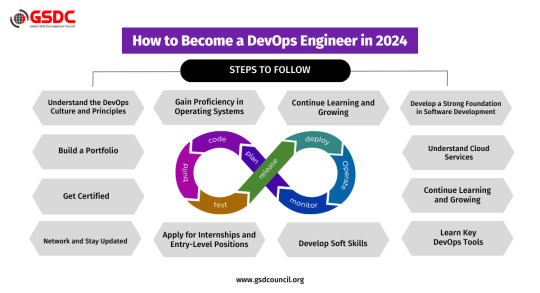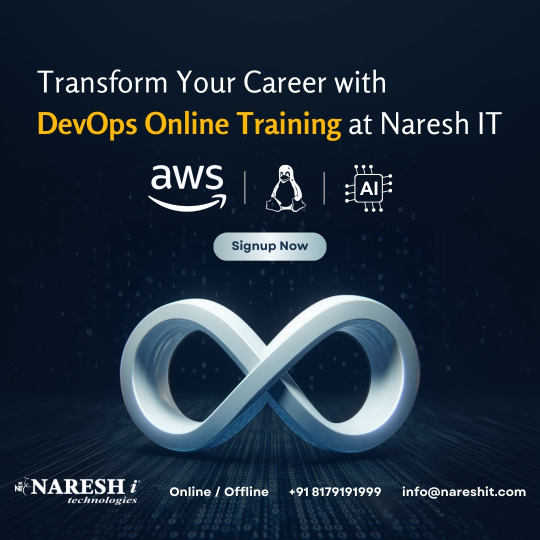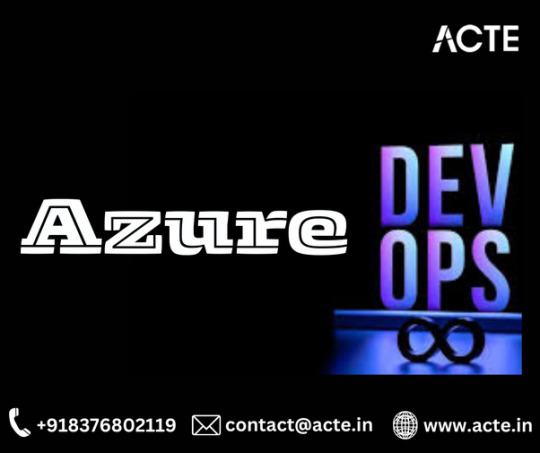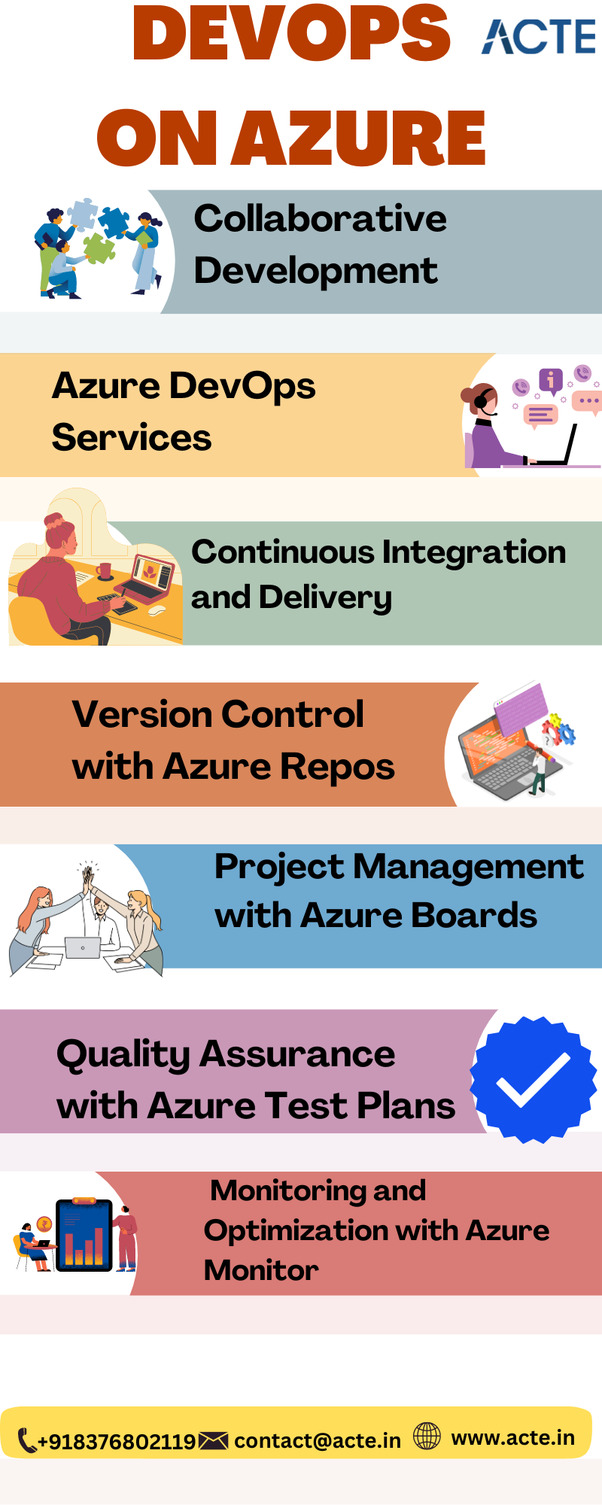#DevOps engineer
Explore tagged Tumblr posts
Text
We at DevLabs are more than just another IT company. We are the catalyst that boosts your business. With a vision to make a change in the existing IT standards, DevLabs Alliance has been dedicated to excelling in the IT domain for the last five years.Headquartered in India, DevLabs Alliance has been able to expand its services worldwide in countries like America.But what we are today was not built overnight. It took a whole cycle of continuous development, learning from mistakes, and slowly bringing a revolution in the IT landscape.
#testing#devops#certifications#softwaredevelopment#technology#web development#automation#dla#devops engineer
0 notes
Text
In 2025, How Can I Become a DevOps Engineer?
As everyone is aware, DevOps has emerged as a crucial component of the modern technology age. However, have you ever considered what qualifications are required to become a professional DevOps engineer and how to become one? We will go through these specifics today with thorough explanations to help you become a DevOps Engineer specialist.

0 notes
Text
A DevOps Engineer focuses on bridging the gap between development and operations teams. They automate processes, manage infrastructure, and monitor system performance to enhance collaboration and efficiency. Integrating continuous development, testing, and deployment practices ensures faster delivery of software and improved system reliability in dynamic environments. Click here to learn more.
0 notes
Text
DevOps Engineer Certification Program
Advance your career with the DevOps Engineer Certification from SkillUp Online. This 7-month program covers essential tools like Git, Docker, Kubernetes, and Azure DevOps while preparing you for Microsoft certifications (AZ-900, AZ-204, AZ-400). Gain hands-on experience and earn 13 certificates to stand out in the job market.
Learn more at: https://skillup.online/devops-engineer-certification-training-course

#devops certificate#devops certificate course#devops engineer certificate#devops engineer certification#devops engineer certification course#devops engineer
0 notes
Text

Boost your career with hands-on DevOps Online Training. Learn from industry experts and gain practical skills to become a DevOps pro. Enroll in our DevOps Online Training to get certified and accelerate your career!
#devops#DevOpsOnlineTraining#LearnDevOps#devops certification#DevOps Courses#DevOps Career#online training#devops engineer#devops tools#devops automation#DevOps Cloud#DevOps Best Practices#DevOps Hands-on Training#DevOps for Beginners
0 notes
Text
Master DevOps: Your Complete Guide and Roadmap | DevOps Online Training

Introduction to DevOps
In today's rapidly evolving technological landscape, the need for streamlined and efficient software development practices has never been greater. Enter DevOps—a culture, philosophy, and set of practices that bring development (Dev) and operations (Ops) together to improve collaboration, integration, and automation throughout the software development lifecycle. DevOps is not just a buzzword; it's a transformative approach that enables organizations to deliver high-quality software faster and more reliably. If you're looking to build a career in this field, DevOps Online Training is your gateway to mastering the skills required to excel in this domain.
What is DevOps?
DevOps is a combination of practices, tools, and cultural philosophies designed to increase an organization's ability to deliver applications and services at high velocity. By breaking down the traditional silos between development and operations teams, DevOps fosters a culture of collaboration, where both teams work together throughout the entire software development lifecycle. This collaboration leads to faster development, more frequent deployment of updates, and higher overall software quality.
At its core, DevOps emphasizes automation, continuous integration, continuous delivery (CI/CD), and monitoring. The goal is to minimize manual intervention, reduce errors, and improve the efficiency of software development and deployment. Through DevOps Online Training, you can learn how to implement these practices in real-world scenarios, making you an invaluable asset to any tech organization.
How DevOps Works
DevOps is built on a set of principles and practices that enable organizations to build, test, and deploy software rapidly and efficiently. Here's how DevOps works in practice:
1. Continuous Integration and Continuous Deployment (CI/CD)
Continuous Integration (CI) is the practice of merging code changes frequently, often multiple times a day, into a shared repository. Automated testing is then conducted to identify and resolve issues early in the development process. Continuous Deployment (CD) takes this a step further by automatically deploying code changes to production after passing the CI pipeline. Together, CI/CD reduces the time between writing code and delivering it to customers, ensuring that software updates are released frequently and reliably.
2. Automation
Automation is a critical component of DevOps. From building and testing code to deploying and monitoring applications, automation helps streamline the entire software development lifecycle. By automating repetitive tasks, teams can focus on more strategic activities, such as optimizing code and improving system performance. Automation tools like Jenkins, Ansible, and Puppet are commonly used in DevOps to create efficient, repeatable processes.
3. Infrastructure as Code (IaC)
Infrastructure as Code (IaC) is the practice of managing and provisioning computing infrastructure through machine-readable scripts rather than manual processes. This approach allows teams to automate the setup and configuration of environments, ensuring consistency across development, testing, and production stages. Tools like Terraform and AWS CloudFormation are popular choices for implementing IaC.
4. Monitoring and Logging
Effective monitoring and logging are essential to maintaining the health and performance of applications in a DevOps environment. By continuously monitoring systems and capturing logs, teams can identify and resolve issues before they impact end-users. Tools like Prometheus, Grafana, and ELK Stack are widely used for monitoring and logging in DevOps.
5. Collaboration and Communication
DevOps is as much about culture as it is about technology. A key aspect of DevOps is fostering a culture of collaboration and communication between development, operations, and other stakeholders. This collaboration ensures that everyone is aligned with the project's goals and that issues are addressed quickly. Tools like Slack, Microsoft Teams, and Jira facilitate communication and collaboration in a DevOps environment.
6. Security in DevOps (DevSecOps)
As security becomes increasingly important in software development, DevOps practices have evolved to include security as a core component. DevSecOps integrates security into every stage of the software development lifecycle, ensuring that security vulnerabilities are identified and addressed early in the process. By adopting DevSecOps practices, organizations can build more secure applications without compromising on speed and agility.
The Roadmap to Becoming a DevOps Engineer
Becoming a DevOps engineer requires a combination of technical skills, practical experience, and a deep understanding of DevOps principles. Here's a step-by-step roadmap to guide you on your journey:
1. Understand the Basics of DevOps
Before diving into specific tools and technologies, it's important to understand the fundamental principles of DevOps. Learn about the core concepts of CI/CD, automation, IaC, and monitoring. DevOps Online Training can provide you with a solid foundation in these areas, helping you grasp the essential elements of DevOps.
2. Gain Proficiency in Programming and Scripting
A strong foundation in programming and scripting is essential for a DevOps engineer. Start by learning a programming language like Python, Ruby, or Go, as well as scripting languages like Bash or PowerShell. These skills will enable you to automate tasks, write custom scripts, and work with various DevOps tools.
3. Master Version Control Systems
Version control systems (VCS) like Git are critical to DevOps practices. Learn how to use Git for version control, branching, and merging code. Understand how to collaborate with other developers using GitHub, GitLab, or Bitbucket. Version control is a fundamental skill that every DevOps engineer must possess.
4. Get Hands-On with CI/CD Tools
CI/CD is at the heart of DevOps, so gaining hands-on experience with CI/CD tools is crucial. Learn how to set up and configure Jenkins, CircleCI, or Travis CI to automate the build, test, and deployment processes. DevOps Online Training often includes practical labs and exercises that allow you to practice using these tools in real-world scenarios.
5. Learn About Infrastructure as Code (IaC)
IaC is a key practice in DevOps, enabling teams to manage and provision infrastructure programmatically. Familiarize yourself with IaC tools like Terraform, AWS CloudFormation, and Ansible. Learn how to write scripts that automate the creation and configuration of infrastructure, ensuring consistency across environments.
6. Develop Cloud Computing Skills
Cloud computing is an integral part of DevOps, as it provides the scalability and flexibility needed for modern software development. Gain proficiency in cloud platforms like AWS, Azure, or Google Cloud. Learn how to deploy applications to the cloud, manage cloud resources, and work with cloud-based DevOps tools.
7. Enhance Your Automation Skills
Automation is a cornerstone of DevOps, so it's essential to master automation tools and techniques. Learn how to automate tasks using tools like Jenkins, Puppet, and Chef. Understand how to create automated workflows that integrate with other DevOps tools and processes.
8. Learn About Monitoring and Logging
Effective monitoring and logging are crucial for maintaining the health of applications in a DevOps environment. Familiarize yourself with monitoring tools like Prometheus and Grafana, as well as logging tools like the ELK Stack. Learn how to set up monitoring dashboards, create alerts, and analyze logs to identify and resolve issues.
9. Embrace DevSecOps Practices
Security is a critical aspect of DevOps, and understanding DevSecOps practices is essential for a successful career in this field. Learn how to integrate security into the CI/CD pipeline, conduct security testing, and implement security best practices throughout the software development lifecycle.
10. Gain Practical Experience
Theory alone is not enough to become a proficient DevOps engineer. Hands-on experience is crucial. Work on real-world projects, contribute to open-source DevOps projects, or participate in internships. Practical experience will help you apply the skills you've learned and build a portfolio that showcases your expertise.
11. Obtain DevOps Certifications
Certifications can validate your skills and make you stand out in the job market. Consider obtaining certifications like AWS Certified DevOps Engineer, Google Cloud DevOps Engineer, or Microsoft Certified: Azure DevOps Engineer Expert. These certifications demonstrate your proficiency in DevOps practices and tools.
12. Stay Updated with Industry Trends
The field of DevOps is constantly evolving, with new tools and practices emerging regularly. Stay updated with industry trends by reading blogs, attending conferences, and participating in online communities. DevOps Online Training programs often include updates on the latest trends and tools in the industry.
13. Build a Strong Professional Network
Networking is important in any career, and DevOps is no exception. Join DevOps communities, attend meetups, and connect with other professionals in the field. Building a strong network can lead to job opportunities, collaborations, and valuable insights.
14. Prepare for DevOps Interviews
As you near the end of your learning journey, it's time to prepare for DevOps interviews. Practice common DevOps interview questions, participate in mock interviews, and review your projects and experiences. DevOps Online Training programs often include interview preparation sessions to help you succeed in landing your first DevOps job.
Conclusion
DevOps is a powerful approach that has revolutionized the way software is developed, tested, and deployed. By fostering collaboration between development and operations teams and leveraging automation, CI/CD, and cloud computing, DevOps enables organizations to deliver high-quality software at a rapid pace. Whether you're just starting your career or looking to transition into the field, DevOps Online Training can provide you with the skills and knowledge needed to succeed as a DevOps engineer.
By following the roadmap outlined in this article, you can develop the technical expertise, practical experience, and industry knowledge required to excel in DevOps. Remember to stay updated with the latest trends, build a strong network, and continuously improve your skills.
#devops#devopsonlinetraining#devops engineer#DevOps Roadmap#web development#development#software#Continuous Integration#Continuous Deployment#Cloud Computing#Automation#Software Development#IT Training#cicd#it training institute#it training courses#it training classes
0 notes
Text
How Remote Hiring Shortens Recruitment Cycles: A Game-Changer for Modern Businesses

Ever feel like you're stuck in a never-ending loop of job postings, interviews, and candidate evaluations? Trust me, you're not alone. The traditional hiring process can sometimes feel like you're trudging through molasses, especially when you've got critical positions to fill and deadlines breathing down your neck. Ever feel like you're stuck in a never-ending loop of job postings, interviews, and candidate evaluations? Trust me, you're not alone. The traditional hiring process can sometimes feel like you're trudging through molasses, especially when you've got critical positions to fill and deadlines breathing down your neck.
But what if I told you there's a way to hit the fast-forward button on your recruitment cycle? Enter remote hiring – the superhero of modern recruitment that's swooping in to save the day (and your sanity).
The Remote Hiring Revolution: Why It's Taking the Business World by Storm
Let's face it – the world of work has changed dramatically in recent years. The pandemic accelerated the shift towards remote work, and guess what? People loved it. A whopping 98% of workers now express a desire to work remotely, at least part of the time. That's not just a trend; it's a seismic shift in how we approach work.
But here's the kicker: remote hiring isn't just about accommodating employee preferences. It's a powerful tool that can transform your entire recruitment process, making it faster, more efficient, and dare I say it – even enjoyable.
Breaking Down the Benefits: How Remote Hiring Speeds Up Your Recruitment
Cast a Wider Net (Without Leaving Your Desk)
Remember the days when your talent pool was limited to a 50-mile radius? Those days are long gone. With remote hiring, you can tap into a global talent pool faster than you can say "video interview." No more waiting for candidates to relocate or limiting yourself to local talent. The world is your oyster, and the pearls of talent are just waiting to be discovered.
Say Goodbye to Scheduling Nightmares
We've all been there – trying to coordinate in-person interviews around busy schedules, commute times, and that one candidate who can only meet during their lunch break. Remote hiring throws those headaches out the window. Video interviews can be scheduled more flexibly, often with shorter notice. This means you can move through your candidate pipeline at lightning speed.
Streamlined Screening: The Fast Track to Finding Your Perfect Match
With remote hiring, you can leverage online assessments and virtual screening tools to quickly evaluate candidates' skills and fit. No more waiting for test results to be mailed in or scheduling separate assessment sessions. It's all integrated into your virtual recruitment process, allowing you to identify top candidates faster than ever.
Faster Feedback, Quicker Decisions
In the world of remote hiring, feedback loops are tighter. Team members can easily hop on a quick video call to discuss candidates right after an interview. No more waiting for everyone to be in the office at the same time. This rapid collaboration leads to faster decision-making, cutting down your time-to-hire significantly.
Real-World Success: Companies Crushing It with Remote Hiring
Don't just take my word for it. Let's look at some companies that have turbo-charged their recruitment cycles with remote hiring:
GitLab, a fully remote company, slashed their hiring cycle by 30%. That's not just an improvement; it's a revolution in recruitment efficiency.
Buffer, another remote-first company, took their average hiring cycle from a lengthy 43 days down to a swift 19 days. Talk about picking up the pace!
Even tech giant IBM saw a 40% reduction in time-to-fill job openings. And here's the cherry on top – they also reported a 20% improvement in the quality of new hires.
These aren't just statistics; they're proof that remote hiring isn't just faster – it's better.
Overcoming the Challenges: It's Not All Smooth Sailing (But It's Worth It)
Now, I'm not going to sugarcoat it. Shifting to remote hiring comes with its own set of challenges. Building a strong company culture with a distributed team takes effort. And yes, sometimes technology can throw a wrench in the works (we've all been in that video call where someone forgets to unmute).
But here's the thing – the benefits far outweigh the challenges. With a little creativity and the right tools, you can create a remote hiring process that not only speeds up your recruitment but also enhances your company culture and attracts top talent.
The Human Touch in a Digital World
One concern I often hear is, "Won't remote hiring make the process feel impersonal?" I get it. There's something about a firm handshake and face-to-face conversation that feels irreplaceable.
But here's a secret – remote hiring can actually make the process more personal. Without the stress of commuting to an interview or the formality of an office setting, candidates often feel more relaxed and authentic in video interviews. This allows you to get a true sense of who they are and how they might fit into your team.
Plus, the flexibility of remote hiring shows candidates that you value their time and are open to modern work arrangements. It's a powerful way to demonstrate your company culture right from the start.
The Future is Remote (And It's Bright)
As we look to the future, it's clear that remote hiring isn't just a temporary solution – it's the new standard. By 2025, it's estimated that 22% of the American workforce will be working remotely. That's 32.6 million people embracing a new way of work.
By adopting remote hiring practices now, you're not just speeding up your current recruitment cycles. You're future-proofing your company, positioning yourself to attract the best talent in an increasingly remote world.
Ready to Hit the Accelerator on Your Recruitment?
So, are you ready to say goodbye to drawn-out hiring processes and hello to swift, efficient recruitment? Offshore hiring is your ticket to shorter recruitment cycles, wider talent pools, and a competitive edge in today's fast-paced business world.
Remember, the goal isn't just to hire faster – it's to hire smarter. Remote hiring gives you the tools to do both, allowing you to build a dynamic, talented team that's ready to tackle whatever challenges come your way.
The future of recruitment is here, and it's remote. Are you ready to embrace it?
#staff augmentation#hire remote developer#remote developer#offshore developer#Strategies for IT Recruitment#DevOps engineer
0 notes
Text
The Best Career Options After Computer Science Engineering
https://krct.ac.in/blog/2024/06/04/the-best-career-options-after-computer-science-engineering/

As a graduate with a degree in Computer Science Engineering, you are stepping into a world brimming with opportunities. The rapid evolution of technology and the expanding digital landscape means that your skills are in high demand across various industries. Whether you are passionate about software development, artificial intelligence, cybersecurity, there is a career suitable to your interests and strengths. In this blog, let us explore some of the best career options after Computer Science Engineering degree.
Best Career Options After Computer Science Engineering
Software Developer/Engineer

Software developers are the architects of the digital world, creating applications that run on computers, smartphones, and other devices. As a software developer, you will be involved in writing code, testing applications, and debugging programs.
KRCT’s robust curriculum ensures you have a strong foundation in programming languages like Java, C++, and Python, making you a prime candidate for this role. You will be tasked with developing and maintaining software applications, collaborating with other developers and engineers; and ensuring that codebases are clean and efficient.
The role requires proficiency in multiple programming languages, a keen problem-solving ability, and meticulous attention to detail.
Data Scientist
Data science is one of the fastest-growing fields, combining statistical analysis, machine learning, and domain knowledge to extract insights from data. KRCT provides the analytical prowess and technical skills needed to thrive in this field.
As a data scientist, you will work with large datasets to reveal trends, build predictive models, and aid decision-making processes. Also, your responsibilities will include collecting and analysing data, constructing machine learning models, and effectively communicating your findings to stakeholders. This career path requires strong statistical and analytical skills, proficiency in tools such as R, Python, and SQL, and the ability to clearly convey complex concepts.
Cybersecurity Analyst

With the increasing number of cyber threats, the demand for cybersecurity analysts is higher than ever. As a cybersecurity analyst, you will monitor networks for suspicious activity, investigate security breaches, and implement necessary security measures to prevent future incidents. Further, this role demands a thorough understanding of security protocols and tools, sharp analytical thinking, and a high level of attention to detail.
Artificial Intelligence/Machine Learning Engineer
Artificial Intelligence and Machine Learning are the currently trending and revolutionizing industries, where we can witness significant milestone from healthcare to finance. KRCT’s focus on cutting-edge technologies ensures you have the skills to build and deploy AI/ML models. As an AI/ML engineer, you will work on creating intelligent systems that can learn and adapt over time.
So, your responsibilities will include developing machine learning models, implementing AI solutions, and collaborating with data scientists and software engineers to innovate and enhance technological capabilities. A strong grasp of algorithms and data structures, coupled with programming skills, is essential for this role.
Full-Stack Developer
Full-stack developers are versatile professionals who work on both the front-end and back-end of web applications. Moreover, KRCT equips you with the knowledge of various web technologies, databases, and server management, enabling you to build comprehensive web solutions.
As a full-stack developer, you will design user-friendly interfaces, develop server-side logic, and ensure the smooth operation of web applications. Additionally, this role requires proficiency in multiple programming languages, an understanding of web development frameworks, and the ability to manage databases.
Cloud Solutions Architect
Cloud computing is transforming how businesses operate, and cloud solutions architects are at the forefront of this transformation. KRCT’s curriculum includes cloud computing technologies, preparing you to design and implement scalable, secure, and efficient cloud solutions.
Also, as a cloud solutions architect, you will develop cloud strategies, manage cloud infrastructure, and ensure data security. Furthermore, this role requires in-depth knowledge of cloud platforms like AWS, Azure, or Google Cloud, along with skills in network management and data security.
DevOps Engineer
DevOps engineers bridge the gap between software development and IT operations, ensuring continuous delivery and integration. KRCT provides a strong foundation in software development, system administration, and automation tools, making you well-suited for this role.
As a DevOps engineer, you will automate processes, manage CI/CD pipelines, and monitor system performance. This role demands proficiency in scripting languages, an understanding of automation tools, and strong problem-solving skills.
Why KRCT?
KRCT stands out as a premier institution for all of its Engineering courses due to its rigorous academic programs, state-of-the-art facilities, and strong industry connections. Our college emphasizes practical learning, ensuring that students are well-versed in current technologies and methodologies. Also, we have the best and experienced faculties in their respective fields.
KRCT’s placement cell has a remarkable track record of securing positions for graduates in top-tier companies. Regular workshops, seminars, and internships are integrated into the curriculum, providing students with valuable industry exposure. Additionally, the college’s focus on research and development encourages students to engage in cutting-edge projects, preparing them for advanced career paths or higher education.
KRCT’s commitment to excellence is reflected in its alumni, who are making significant contributions in various sectors worldwide. The supportive community and extensive network of alumni also provide ongoing mentorship and career guidance to current students.
To Conclude
Graduating from KRCT opens up numerous career options after computer science engineering degree in the technology sector. Whether you choose to become a software developer, data scientist, cybersecurity analyst, AI/ML engineer, full-stack developer, cloud solutions architect, or DevOps engineer, the knowledge and skills you develop during your engineering degree will pave the way for a bright future. Thus, embrace the opportunities, continue learning, and let your passion for technology guide you towards your ideal career path.
Tags:
AIArtificial Intelligence/Machine Learning Engineerb tech course computer sciencecampuscomputer engineering and software engineeringcomputer science engineering courses after 12thCybersecurity AnalystDevOps EngineerFull-Stack Developergovernment job for csegovernment jobs for computer science engineersSoftware Developersoftware engineering degreeswhat are the best placement opportunities in future for cse?which course in engineering is suitable for future?
#krct the top college of technology in trichy#best autonomous college of technology in trichy#top college of technology in trichy#admission#AIArtificial Intelligence/Machine Learning Engineering#b tech course computer science#campus#computer engineering and software engineering#computer science engineering courses after 12th#Cybersecurity Analyst#DevOps Engineer#Full-Stack Developergovernment job for cse#government jobs for computer science engineers#Software Developer#software engineering degrees#what are the best placement opportunities in future for cse?#which course in engineering is suitable for future?why c#Computer science engineering future job opportunities#Computer engineering government job opportunities#Computer engineer job opportunities in abroad#Computer engineering importance in education#Importance of computer engineering
0 notes
Text
0 notes
Text
Docker-Compose is an indispensable tool for managing multi-container Docker applications. With a simple YAML file, you can define, configure, and deploy all the services your application needs.
0 notes
Text
#agile development#backend development#conclusion#continuous deployment#continuous integration#deployment#designing#DevOps#DevOps engineer#documentation#FAQs#frontend development#introduction#lean development#maintenance#product manager#Programming Languages#quality assurance engineer#requirement analysis#scrum master#software development#software development jobs#software development life cycle#software engineer#test-driven development#testing#types of software development#user documentation#what is software development
0 notes
Text
What is DevOps?
DevOps is a partnership between IT Operations and Development that enables automated and repeatable software development and deployment. The firm can provide software applications and services more quickly thanks to DevOps. The words “Development” and “Operations” are combined to make the full term “DevOps.”
1 note
·
View note
Text
Unlocking the Power of DevOps on Azure: A Comprehensive Guide
In today's rapidly evolving technological landscape, the adoption of DevOps practices has become imperative for organizations striving to deliver high-quality software at a faster pace. Microsoft Azure, with its robust suite of cloud services, provides an ideal platform for implementing and maximizing the benefits of DevOps. This comprehensive guide will walk you through the key components, best practices, and tools available on Azure to unlock the full potential of DevOps.
Azure Overview
Azure is Microsoft's cloud computing platform, providing a wide range of services to help organizations build, deploy, and manage applications. When combined with DevOps practices, Azure becomes a powerful tool for achieving continuous integration and continuous delivery (CI/CD)."In the world of continuous improvement, DevOps training in Hyderabad is the compass that guides your team towards efficiency and innovation."

Integration with DevOps
Azure seamlessly integrates with popular DevOps tools and services, creating a robust ecosystem for application development. This integration ensures that development teams can leverage Azure's capabilities to streamline processes, automate tasks, and deliver software faster and more reliably.
Understanding DevOps on Azure
DevOps on Azure is a collaborative and streamlined approach to software development and IT operations, leveraging Microsoft's cloud computing platform, Azure. It combines the principles of DevOps with the robust features of Azure to enhance the entire development lifecycle.
1. Collaborative Development:
DevOps on Azure promotes collaboration between development and operations teams. It breaks down silos, fostering a culture where both teams work together seamlessly to achieve common goals.
2. Azure DevOps Services:
Azure offers a suite of tools known as Azure DevOps Services, covering version control, build automation, release management, and more. These services act as a central hub, providing a unified platform for efficient project planning, tracking, and execution.
3. Continuous Integration and Delivery (CI/CD):
Azure Pipelines, a key component, automates the build, test, and deployment processes, enabling teams to achieve continuous integration and continuous delivery. This results in faster and more reliable software releases.
4. Version Control with Azure Repos:
Azure Repos, integrated with Azure DevOps, provides robust version control supporting Git and TFVC. It ensures effective source code management and collaboration, crucial for a smooth development workflow.
5. Project Management with Azure Boards:
Azure Boards facilitates agile project management, allowing teams to plan sprints, track work progress, and manage backlogs. This ensures visibility and transparency throughout the development cycle.
"Break free from limitations. Our DevOps online course empowers you to upscale your skills, all from the comfort of your home."

6. Quality Assurance with Azure Test Plans:
DevOps on Azure includes Azure Test Plans, a testing tool that assists teams in planning, tracking, and managing testing efforts. This ensures the quality and reliability of applications before deployment.
7. Monitoring and Optimization with Azure Monitor:
Azure Monitor provides comprehensive insights into the performance and health of applications and infrastructure. This monitoring solution allows proactive identification and resolution of issues, contributing to a more stable and reliable system.
Summarize the key takeaways from the guide, emphasizing the seamless integration of DevOps practices on Microsoft Azure. Encourage organizations to leverage the powerful combination of Azure's cloud services and DevOps principles to enhance agility, collaboration, and overall software delivery capabilities.
0 notes
Text
0 notes
Text
Allyn Dilly - A Senior Security DevOps Engineer
Allyn Dilly, the harmonious multitasker, excels as a Senior Security DevOps Engineer. When not safeguarding digital realms, he orchestrates heartwarming cancer benefit shows such as "Bearded Dragon," sharing stages with his dad. Offstage, he coaches his children's sports teams, dives into video games, and explores the cosmos.
1 note
·
View note